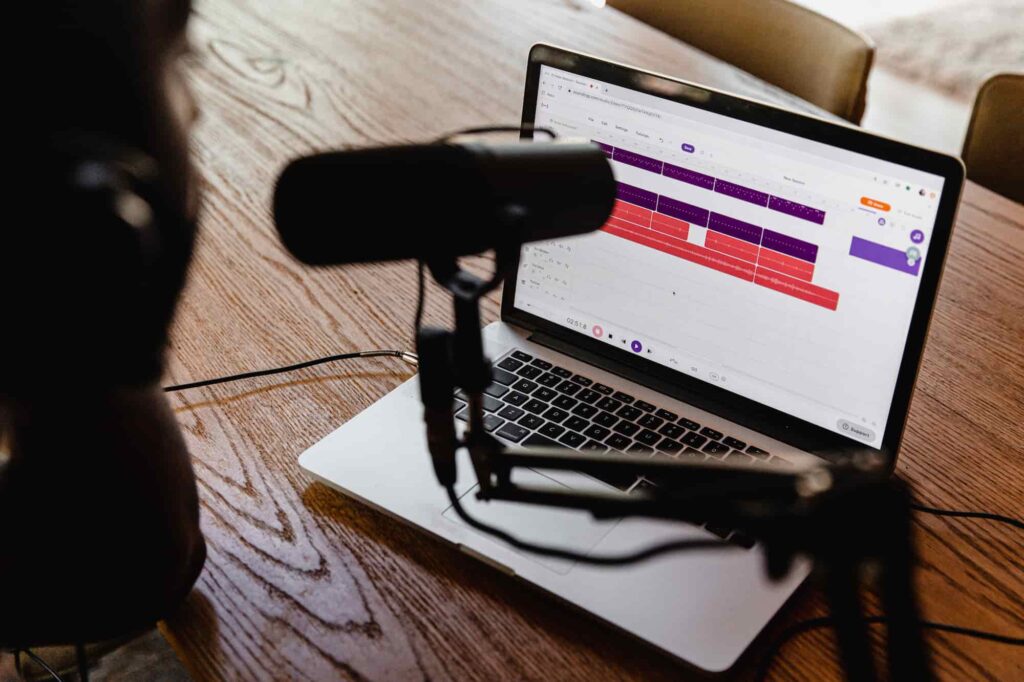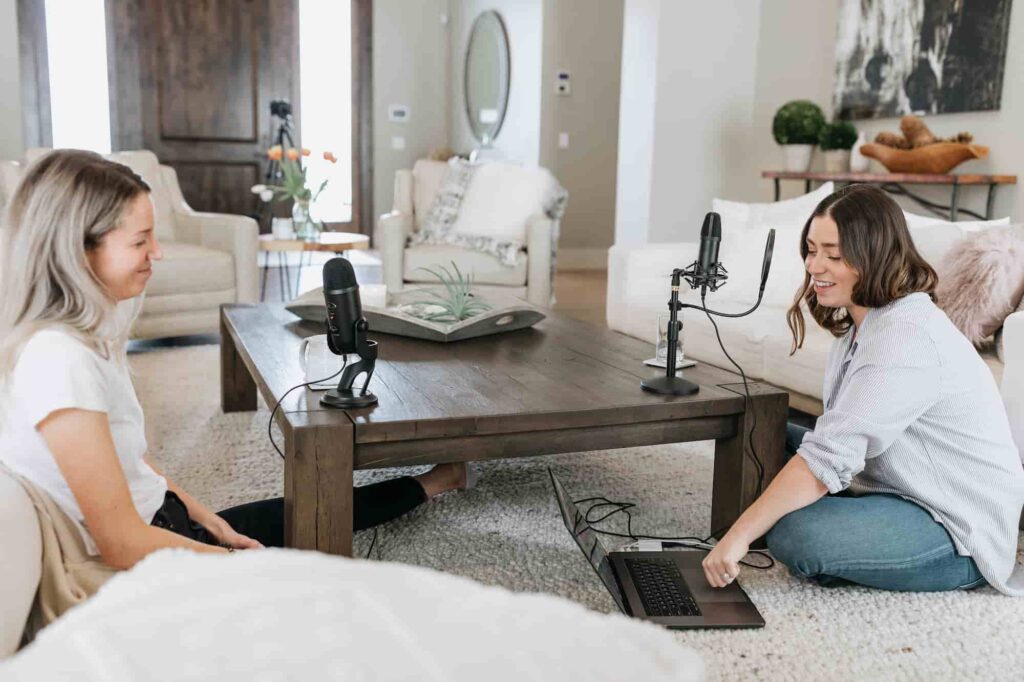The case for hiring a podcast producer vs doing it on your own.
Is it possible to produce an entire podcast by yourself? It can’t be that hard, can it?
Record a conversation, clean it up, upload it to Spotify, right? Instant followers; instant celebrity – here we come, Joe Rogan!
It’s true that in the podcast world, you’ve got two options: Hire a podcast producer, or take a stab at producing your podcast entirely on your own.
The right answer lives at the intersection of your budget, how fast of a learner you are, and how much time and effort you want to put into your podcast.
Considering Being Your Own Podcast Producer? Here’s What You Need to Know
The way to think about editing is that it is the podcast producer’s job to make you and your guests sound smart and concise.
If you are considering going about this task yourself, it is important to remember this is what the process is going to look like.
Podcast Recording
Depending on the quality of podcast you wish to put out, your needs for recording may be as simple as having a computer, a $100 microphone, and headphones. You can always throw something digestible together using your computer’s built in recording software.
To sound more professional, or if you are considering being a podcast producer yourself, you’re going to want to have a few other things. Read our guide to podcast equipment here
Podcast Editing and Producing
As far as content editing goes, which is the act of listening back through the recordings, removing unwanted sounds, correcting spoken mistakes, and taking out things that don’t glue the story together cohesively.
For a one hour recording of audio, you can reasonably expect your editing to consume about an eight hour day, and this is not including the possibility that if you’re a beginner, you may need to spend time watching tutorials and troubleshooting software issues that may arise.
To save you some trouble, the most commonly recommended free podcast software are called Audacity – or Garage Band if you use a Mac.
Assuming you don’t know how to use those things. I’d add at least another four to six hours of tutorials that you would probably have to take online or find those resources. Then, to get everything up on Libsyn (or another distributor) you would likely need to type into Google “how to get my podcast up on Apple/Stitcher/Google Play” and go from there.

Podcast Distribution Across Channels + Artwork and Show Notes
This latter part is called Podcast Distribution. Some alternatives to Libsyn are Anchor FM, Podbean, and Podfly. Note that all are paid services. And so deciding on which package you want and understanding what those packages mean, I’d add another three hours there.
Another thing you’ll have to do is ensure that your artwork is fitting to the required specs as requested by each company. Assuming you’re going to use artwork, ensure that your resolution is high, because the image will be scaled down for people’s phones.
However long you think you would take to do whatever kind of logo and artwork, I’d probably at least guess four hours there when start to finish from first thought to an actual rough draft of a logo.
A word of caution: Be sure to double check everything when submitting your podcast to Apple. If you make any kind of mistakes, Apple is frustrating to deal with – for whatever reason, you can’t get a hold of an actual human being at Apple in regards to podcasts. And this may result in weeks of something being held back from release.
The best thing you can do is get your RSS feed submitted to Apple. Because if it doesn’t get approved by Apple, then you’re potentially waiting for possibly another two weeks to get it approved because their customer service with podcast stuff is very bad.
Time Frame – How long does it take to get one episode ready for listening?
If you’re 100% new to podcast editing, one episode to get it officially launched could take upwards of 40 hours.
As you get better and your skill improves, you can reduce it, but like anything, it’ll take you time to get to that point.
Editing that audio down to being something that sounds pretty good and suitable for the internet – for example, taking out some of the breaths, some of the us, the ohms, the duhhs – would take about six to eight hours of your time.

The Value of Hiring a Podcast Producer
To hire a podcast producer, it can be as simple for you as “record your conversation, send it to them, and let them handle all the hard work, so you can focus on doing other recordings and growing your business.”
The podcast producer would make your recording sound a lot more professional, and cohesively put together than if you left your recording as simply the full unedited running tape. (think, bathroom breaks, people coughing, making comments off topic, etc).
Beyond just editing, a podcast producer also gets your recording ready for distribution on the back end.
So if you have any intros, theme music, ad bumpers, they would put that all inside there in the audio and then make sure that it gets to all of the right places and make sure it shows up in Apple, Spotify, Stitcher Google play, etc.
Hiring a podcast producer can make it easy for you to sound professional.
The podcast producer makes sure that when somebody else opens the podcast app and whatever podcast app that your show is there, is searchable and able to be listened to.
Think of the producer as the person who makes it all into a package that is just ready for the internet to absorb.
Does a Podcast Producer help with pre-production?
Most podcast producers offer a service of a “pre-production producer service”, which is like them being on retainer and available to answer your questions.
For example, you can get their advice on the best equipment to purchase within your budget. Get coaching how to use the gear, set everything up.
They can give you advice on how to use your software, schedule out your production schedule, and coach you up on how to use and operate everything you need, or be available for troubleshooting.
What usually happens is they are your guide to getting everything set up perfectly for your show to operate, and teach you how to implement systems that work for you, and stay by your side for the first two or three sessions of your show.
Once you get the hang of everything, then they step back into more of an editing and distribution role, available to you when you need them. Most files are shared with Google Drive and Dropbox, and everybody usually agrees to a production schedule from there on out to ensure the podcast goes out daily, weekly, monthly, etc according to plan.
What if I just want a scrappy podcast with minimal editing?
You certainly can do that! For example, My Favorite Murder started off with just them cutting off the beginning and the end of the episode and throwing a recording in the middle. Some shows do succeed that way.
A word of warning: with the more and more podcasts that are being made every day, the talking heads style of “two guys drinking beer in their basement talking about life” type of podcast is a trend that’s on it’s dying end.
Not a lot of shows truly succeed that way, comparatively. To make your podcast stand out, you either need to be 1) a truly unique, exceptional content creator or 2) professional and authoritative sounding.
Or ideally, both.
How to Succeed as a Podcast with a Minimal Budget
If you’re just getting started, and you know you won’t be able to hire a podcast producer, it will likely just be a longer road (because you will have to do everything yourself) but there is of course still hope for you.
Take the point of the popular podcast My Favorite Murder. When they first got started, they were on a non-existent budget, and had to be very smart about engaging with their audience, and building their fan base.
They were always savvy to remember that people didn’t listen to them for just the show – the show was just a part of the bigger package that was the opportunity to engage with the show. And people loved it.
The hosts also worked incredibly hard, went on tours, and interacted beautifully with their fan base.
The good news about touring* with a podcast is that it can be a lot more affordable. All you need is to bring your microphone with you wherever you go. The budget from a typical touring show can be slashed by thousands of dollars, yet it allowed them to intimately engage with their fan bases in different cities.
*obviously, don’t go on podcast tours until the covid-19 situation clears up.
if you have very informative or engaging content, then your audience will be more forgiving for how polished it is.
One tip. People love a good strong opinion. Whether they disagree or agree with you, listeners love hearing other people’s juicy opinions in podcasts.
Okay, I’m convinced. I want to hire a podcast producer. What’s the best way to go about doing that? How do I know they’re any good?
Most of my clients come to me from word of mouth, and I imagine it would be the same for how you would find a good podcast producer. Try asking people in your online groups you’re a part of, or friends, for an introduction to someone who might have some experience in editing audio, or has produced a podcast before.
If a podcast producer takes their work seriously, they’ve likely got people who have heard of them through friends, colleagues, and past client referrals.
You can always contact me to get a free quote.
As far as say, you are interviewing, say you have a podcast and you’re choosing between two or three.
What Questions Should You Ask a Potential Podcast Producer?
Ask them to send a resume, but then also ask them what shows they’ve worked on before.
And if they can send you some of their work, preferably it would be work that can be found publicly via links on Apple, Spotify or Stitcher sharing space with other professionally produced podcasts.
The point is that you should be able to hear what they’ve done for others, and get a feel for what they can do for you.
If you have the budget, it’s best to bring that up right away, so they can respond truthfully if they’re in your price range without wasting anyone’s time.
Go for the Personal Touch
If everybody you contact is able to provide everything above, and you still can’t decide who to hire? Make your decision based off of the person themselves. You’re going to have to work intimately with them, and the more enjoyable of a human they are, the better your experience is going to be.
A lot of podcast producers will just have clients upload their audio to a website and then the client takes it and, or the producer editor will take it, edit it, and then re upload it and will treat it like a, “here you go, thanks!” basic transaction – it will leave you feeling dirty or unvalued.
If you can find a producer who treats you like a respectable human and who you can have a good conversation with – and they’re willing to invest the time in your show, then choose that person.
Remember, you’re hiring them to help you. While you’re their employer, they should respect the fact that they’ve got a job to do, and should also be willing to invest time in your show to just make it better.
To make it easiest on yourself…reach out to me. If I can’t answer your question, I’ll at least be able to point you in the right direction.
